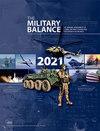第二章:国防统计比较
Q3 Social Sciences
引用次数: 3
摘要
a根据北约国防开支定义;b包括美国对外军事援助注:美元总额采用2017年平均市场汇率计算,采用国际货币基金组织数据推导。各国的相对地位不仅会因国防开支水平的实际调整而变化,还会因本国货币与美元之间的汇率波动而变化。使用平均汇率可以减少这些波动,但在许多情况下,这种波动的影响可能是显著的。本文章由计算机程序翻译,如有差异,请以英文原文为准。
Chapter Two: Comparative defence statistics
a Under NATO defence-spending de nition; b Includes US Foreign Military Assistance Note: US dollar totals are calculated using average market exchange rates for 2017, derived using IMF data. The relative position of countries will vary not only as a result of actual adjustments in defence-spending levels, but also due to exchange-rate uctuations between domestic currencies and the US dollar. The use of average exchange rates reduces these uctuations, but the effects of such movements can be signi cant in a number of cases.
求助全文
通过发布文献求助,成功后即可免费获取论文全文。
去求助
来源期刊

The Military Balance
Social Sciences-Political Science and International Relations
CiteScore
1.00
自引率
0.00%
发文量
18
 求助内容:
求助内容: 应助结果提醒方式:
应助结果提醒方式:


